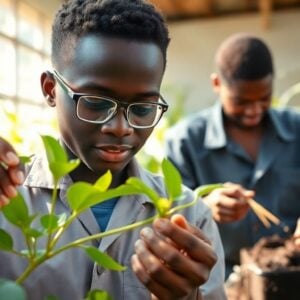The University of Venda (UNIVEN) and the Food and Agriculture Organization of the United Nations (FAO) have established a results-driven partnership aimed at enhancing food security, climate resilience, and sustainable rural livelihoods in Limpopo and the surrounding region. The collaboration focuses on translating academic research into practical solutions for farmers and youth, ensuring that teaching, research, and outreach directly benefit local communities.
Guided by FAO’s Strategic Framework 2022–31, the partnership seeks to transform agrifood systems into more efficient, inclusive, resilient, and sustainable models, delivering the “Four Betters”: Better Production, Better Nutrition, a Better Environment, and a Better Life. FAO emphasizes innovation, data-driven decision-making, and partnerships to scale climate-smart practices, connect early warning systems to early action, and invest in the skills communities need to anticipate risks and thrive.
A central feature of the collaboration is FAO’s Data in Emergencies (DIEM) platform, which provides open-access, high-frequency data from over 30 countries. This includes household-level surveys on agricultural livelihoods, food insecurity, and exposure to climate shocks. The platform supports evidence-based research and fosters collaboration between academia and field practitioners, catalyzing research outputs that are both locally grounded and globally relevant.
UNIVEN, located in the biodiversity-rich yet climate-vulnerable Vhembe Biosphere Reserve, serves as a strategic hub for developing locally led solutions. The partnership integrates indigenous knowledge with modern technologies, including remote sensing, GIS, and mobile data collection, enabling field pilots and academic curricula to combine traditional practices with precision and regenerative farming approaches.
The joint roadmap prioritizes innovation, data, partnerships, and skills development. Digital tools will monitor crops, rangelands, and water resources, while precision and regenerative farming practices will enhance productivity and restore ecosystems. Open and ethical data pipelines will link early warning systems to anticipatory action, and collaborations with authorities, farmers, the private sector, and civil society will help scale proven solutions. Postgraduate training and community practicums will prepare the next generation of extension officers and agripreneurs.
To ensure effective implementation, UNIVEN and FAO have established governance measures including designated focal points, regular information exchange, and a shared pipeline of research and outreach activities. This approach ensures that pilots can scale, results are tracked, and funding opportunities are leveraged. By connecting classrooms and laboratories with local communities, the partnership aims to generate evidence that informs policy, strengthens local capacities, and supports green and digital employment opportunities.
Dr. Lewis Hove of FAO emphasized that combining innovation, accurate data, and inclusive partnerships will protect harvests, improve diets, and create sustainable green jobs, underscoring agriculture’s central role in addressing current global challenges.







